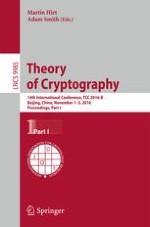2016 | OriginalPaper | Chapter
Separating Computational and Statistical Differential Privacy in the Client-Server Model
Authors : Mark Bun, Yi-Hsiu Chen, Salil Vadhan
Published in: Theory of Cryptography
Publisher: Springer Berlin Heidelberg
Activate our intelligent search to find suitable subject content or patents.
Select sections of text to find matching patents with Artificial Intelligence. powered by
Select sections of text to find additional relevant content using AI-assisted search. powered by
